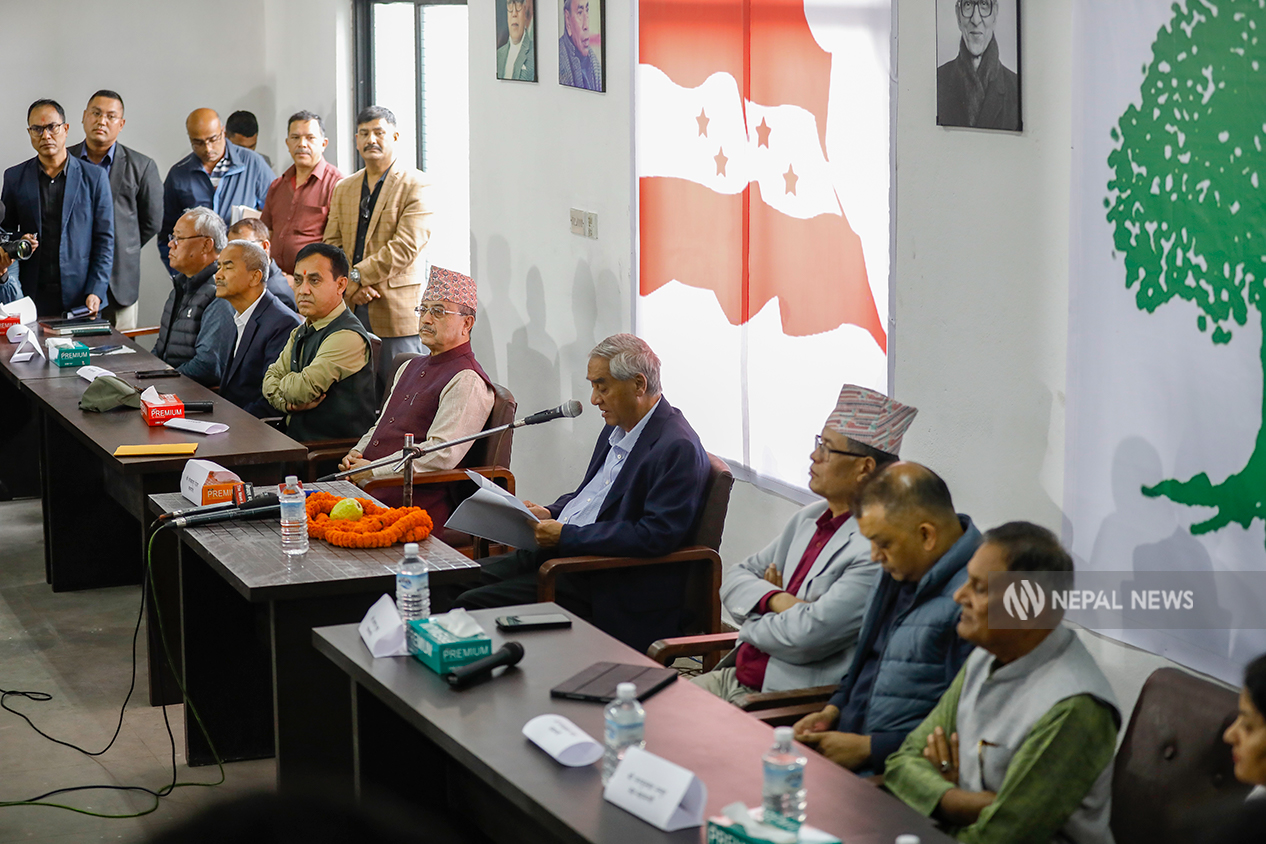

KATHMANDU: Nepali Congress President Sher Bahadur Deuba appeared in public on Tuesday after 34 days, following his absence since the Gen Z protest of September 9, where he and his wife, Nepali Congress central committee member Arzu Rana Deuba, were assaulted.
Attending the Central Working Committee meeting at the party headquarters in Sanepa, Lalitpur, journalists asked him about his health.
Deuba responded in his usual calm manner, “I’m fine, I’m fine.”
Shortly afterward, he addressed the committee, announcing that the party would move toward its next general convention as per the statute.
Pointing to his health condition, he declared Vice President Purna Bahadur Khadka as the acting president. The meeting was then adjourned until October 16.
At a time when signatures for a special general convention were being collected, Deuba’s announcement signaled his withdrawal from the party’s executive role.
Indicating his departure from active Nepali Congress politics, he stated that he would not return to party leadership.
“Just as every household eventually changes its head, so must a party. I have already said that I will formally hand over leadership at the 15th General Convention. Someone else will lead the party after that — there is no doubt about it,” Deuba said.
Under the party’s statute, no one can serve as president for more than two terms, which means Deuba cannot contest again.
He urged leaders vying for leadership to uphold the party’s credibility and the people’s trust, calling for a fair and statute-based convention.
With Khadka appointed as acting president, attention now turns to how the 15th General Convention will proceed.
Over 2,485 representatives have signed a petition demanding a special convention, while Deuba’s exit aims to counter the criticism that he had stalled the process.
His move also indirectly addressed the demands of General Secretaries Gagan Thapa and Bishwa Prakash Sharma, who had been leading the campaign for an early convention.
Central committee member and dissident leader Shekhar Koirala said Deuba’s statement had created a favorable environment for the next convention.
“He has expressed readiness to step down and appointed an acting president. This means the environment for a regular convention has been set,” Koirala remarked.
During the intense debate over leadership change following the Gen Z protests, Deuba’s supporters had opposed the idea of a special convention, arguing it would divide the party.
Senior leader Krishna Prasad Sitaula said Deuba’s decision would help unify the party. “Change cannot come hastily through a special convention,” he noted.
Deuba’s announcement, however, has disappointed leaders who had been seeking to prove him wrong or replace him urgently.
His supporters say the move opens the door for an orderly convention and party unity.
“Now, the 15th convention will be held as per the committee’s consensus, not as a special convention,” said leader Bijay Gachhadar, a close ally of Deuba.
“Changing leaders alone won’t revitalize Congress — we must strengthen unity and readiness for national responsibility,” he remarked.
Party spokesperson Prakash Sharan Mahat said the regular general convention would be held at an appropriate time in line with national and party responsibilities.
“No one has said it will be within a year or a year and a half,” he clarified, “but it must follow due process.”
He added that the central committee would determine the required timeframe, possibly within a few months, through consensus.
The Nepali Congress statute requires a general convention every four years.
The last one, held in December 2021, re-elected Deuba for his second term.
By that timeline, the next convention should be held in December 2025.
However, with only two months left, the renewal and distribution of active memberships — the basis for the convention — have yet to be completed.
After the Gen Z movement, calls for immediate leadership change within the party intensified.
With Deuba stepping back, speculation now grows over how the Nepali Congress will conduct its 15th General Convention and what the next phase of leadership will look like.